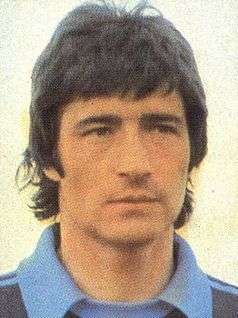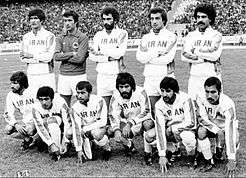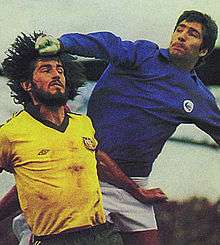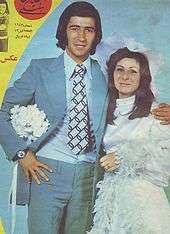Nasser Hejazi
 | |||
| Personal information | |||
|---|---|---|---|
| Date of birth | 14 December 1949 | ||
| Place of birth | Tehran, Iran | ||
| Date of death | 23 May 2011 (aged 61) | ||
| Place of death | Tehran, Iran | ||
| Height | 1.85 m (6 ft 1 in) | ||
| Playing position | Goalkeeper | ||
| Senior career* | |||
| Years | Team | Apps | (Gls) |
| 1964–1965 | Nader | ||
| 1967–1977 | Taj | ||
| 1977–1980 | Shahbaz | ||
| 1980–1986 | Esteghlal | ||
| 1986–1987 | Mohammedan | ||
| National team | |||
| 1968–1980 | Iran | 62 [1] | (0) |
| Teams managed | |||
| 1988 | Mohammedan | ||
| 1988–1989 | Shahrdari Kerman | ||
| 1989 | Bangladesh | ||
| 1990–1992 | Bank Tejarat | ||
| 1992–1993 | Shahrdari Kerman | ||
| 1994–1995 | Sepahan | ||
| 1995–1996 | Mashin Sazi | ||
| 1996–1999 | Esteghlal | ||
| 1999–2001 | Zob Ahan | ||
| 2001–2002 | Esteghlal Rasht | ||
| 2003 | Mashin Sazi | ||
| 2003–2004 | Esteghlal Ahvaz | ||
| 2006–2007 | Nassaji Mazandaran | ||
| 2007 | Esteghlal | ||
|
* Senior club appearances and goals counted for the domestic league only. | |||
Nasser Hejazi (14 December 1949 – 23 May 2011), nicknamed "the legendary goalkeeper",[2][3][4][5] was an Iranian football player and coach who most notably played for Esteghlal Tehran FC (Taj).
Considered as the best goalkeeper in the history of Iranian football and Asia, he was capped 62 times for the Iran national football team. In 2000, the Asian Football Confederation ranked him the second best Asian goalkeeper of the 20th century.[6]
He was goalkeeper of Iran national team in the 1960s and 1970s and won the AFC Asian Cup on two occasions in 1972 and 1976, and Asian Games title once, and competed in the 1972 Munich Olympics and 1976 Montreal Olympics and 1978 FIFA World Cup.
As a Manager, he won an Azadegan League in 1998 and a Bangladesh League in 1988, as well as a runner-up place in AFC Champions League in 1999.
Early life
Hejazi was born on 14 December 1949 in Tehran, Iran.[7] His father, Ali Akbar had a real estate agency in Tehran and was an Iranian Azerbaijani from Tabriz.[8] He was admitted to Allameh Tabatabai University in 1977.[9] He was later enrolled in Nader F.C. in 1964 and played for club until 1965. After that, he signed a contract with Taj Tehran and started his career in a professional club.
Club career
Hejazi was the goalkeeper of the Taj Tehran and Iran during the 1970s. Hejazi first broke into the Taj side when he was only 18 years old and while a member of the now defunct Nader FC. He won the Asian Club Championship in 1970; he also won the Iranian league in 1971 as well as 1975 and was positioned second in 1974. Further on, he won the Hazfi Cup in 1977.
In summer 1977 he changed the club joining Shahbaz Tehran, trying to win the 1977–78 Takht Jamshid Cup with his famous National team mates Gholam Hossein Mazloumi, Nasrollah Abdollahi, Ebrahim Ghasempour and Hamid Majd Teymouri. So it was a tremendous surprise, that Shahbaz could only reach the 11th place. In the following year Shahbaz was leading the ranking in the season 1978/79, when in autumn 1978 – due to the political uprisings, which ended with the Iranian Revolution in February 1979 – the season was canceled.

After the 1978 FIFA World Cup, Hejazi received an offer from Manchester United. He trained and played with the club for a month, even appearing in a reserve match against Stoke City. Manchester United manager Dave Sexton wanted Hejazi to stay for another two or three months before officially signing a contract with him, but there was no-one at the IRFF at the time of the Iranian Revolution to arrange the extension, which led to Manchester United signing Gary Bailey instead.
Hejazi remained as Esteghlal's main goalkeeper until 1986. There he won the Tehran Province League in 1983 and 1985 and the runners-up position in 1982.
His last station was the Bangladeshi club Mohammedan in Dhaka, where he stayed for one year and could win his last league title.
International career

Hejazi joined up with the Iran National Team, just in time to feature in the squad that won the Asian Cup in 1968 and picked up two more in 1972 as the first choice and 1976 as the second choice goalkeeper.
He also represented Iran at the 1972 Munich Olympics and reached the quarter-finals of the football tournament at the 1976 Olympics in Montreal. In 1974, he had a key role in Iran's victory in the final match of the football tournament of the Asian Games in Tehran (Bahram Mavadat and Mansour Rashidi had played the prior matches).
Hejazi's most valued tournament was the 1978 FIFA World Cup in Argentina, where he participated as Iran's starting goalkeeper.
He was the captain of the national team during the 1980 Asian Cup and played his last match for Iran in the semi-final match versus Kuwait. After the tournament, a member of Iran's Physical Education Department implemented a policy in which athletes older than 27 years of age would no longer be allowed to compete internationally. Hejazi was effectively forced to retire from international football back then, in spite of being only 29 years old at the time of implementation.
International caps
| Iran | ||
|---|---|---|
| Year | Apps | Goals |
| 1969 | 2 | 0 |
| 1970 | 4 | 0 |
| 1971 | 4 | 0 |
| 1972 | 11 | 0 |
| 1973 | 4 | 0 |
| 1974 | 2 | 0 |
| 1975 | 4 | 0 |
| 1976 | 4 | 0 |
| 1977 | 9 | 0 |
| 1978 | 6 | 0 |
| 1980 | 12 | 0 |
| Total | 62 | 0 |
Managerial career
Hejazi coached Bangladeshi football club Mohammedan from 1987 to 1991. During his time, Bangladeshi football was enlightened with the modern day technique of football and embraced top football coaching. The Bangladeshi football Federation rewarded him by making him national team coach in 1989.
During the 1990s, Hejazi was the manager of a number of football clubs including the Mohammedan SC, the Esteghlal (former Taj) and Esteghlal Ahvaz. During his tenure with the Esteghlal, Hejazi won the Iranian League in 1998, then took the club to the final match of the Asian Champions League in 1999. They were beaten by the Júbilo Iwata in Tehran. During his years as a coach, Hejazi was the first to discover several talented Iranian football players, including Rahman Rezaei in Zobahan and Alireza Akbarpour in Machine Sazi Tabriz. In early August 2006 Hejazi announced he signed a one-year contract as head coach of Azadegan League outfit Nassaji Mazandaran. He resigned from the post on 19 January 2007. On 5 August 2007, He was appointed as head coach of Esteghlal for a second time but he was sacked by club on 8 November 2007 because of bad results after 14 matches.
| Team | From | To | Record | |||||||
|---|---|---|---|---|---|---|---|---|---|---|
| G | W | D | L | GF | GA | +/- | ||||
| Esteghlal | February 1996 | December 1999 | 81 | 39 | 25 | 17 | 127 | 73 | +54 | |
| Esteghlal | August 2007 | November 2007 | 14 | 5 | 5 | 4 | 21 | 19 | +2 | |
Honours

Player
Club
- Esteghlal
- Asian Club Championship (1) 1970
- Iranian Football League (1): 1974–75
- Tehran Provincial League (2): 1982–83, 1984–85
- Mohammedan
- Dhaka League (1): 1986–87
International
- Iran
- Asian Cup (2): 1972, 1976
- Asian Games (1): 1974
Manager
- Mohammedan
- Dhaka League (2): 1987–88, 1988–89
- Esteghlal
Political career

Presidential candidacy
On 3 November 2004, Hejazi announced his nomination for 2005 presidential election. He was rejected by the Guardian Council of the Constitution of Islamic Republic of Iran, arguing his lack of political career prior to the election. Later on, he became a supporter of Ali Akbar Hashemi Rafsanjani.
In 2009 presidential election, he supported Mir-Hossein Mousavi.
Opposition to Ahmadinejad
He was an opponent to the Economic reform plan of President Mahmoud Ahmadinejad's Government. In April 2011, he made a statement regarding the plan: "I'm very sorry for our people, they have oil, petroleum and ... but some of them are poor".[10]
It is known that after this comment, he was unofficially banned from Iranian Television Network. This was later revoked due to his popularity and the perceived side effects that could have come from this decision.
Personal life
Hejazi married Behnaz Shafie in 1973.[11] He became father of two, one daughter, Atoosa and one son, Attila, who both grew up to play soccer just like their father. Attila has been playing in Esteghlal B from 1997 to 2004 and Atoosa was the captain of Iran national women futsal team. Atoosa is married to an Iranian retired soccer player Saeed Ramezani who formerly played for Zob Ahan, Sepahan and Foolad in the Iran Pro League. They have a son named Amir Arsalan.
Cancer struggle and death
Hejazi was diagnosed with aggressive lung cancer in late 2009. While trying to resume normal daily activities as a coach, his illness forced him to be hospitalised. Hejazi went into a coma on 20 May 2011 as he was watching the match between Esteghlal and Pas Hamedan soccer teams in the final week of the Iran Pro League. On 23 May 2011, after being unable to recover from a stroke, he died at 10:55 a.m. in Kasra Hospital in Tehran.[12][13] His funeral was held on 25 May 2011 in Azadi Stadium in western Tehran and his body was buried in the Behesht-e Zahra cemetery in southern Tehran on the same day as his final resting place. More than 20,000 people attended his funeral.[14]
Hejazi's popularity went beyond Iran's borders as Manchester United manager Sir Alex Ferguson expressed the club's sympathy for Hejazi's illness in April 2010. In a message, President Mahmoud Ahmadinejad paid homage to Hejazi and characterised him as a renowned and good-tempered Iranian football figure who offered valuable services to national sport.
Legacy
Hejazi is considered by many to be the best Iranian and Asian goalkeeper of all time. Hejazi was a member of the all-conquering Iran national team of the 1960s and 1970s that won the Asian Cup a record three times in a row and represented Iran at two Summer Olympics as well as 1978 FIFA World Cup. After his death, it was proposed that a new stadium named after Hejazi would be built in Tehran. Esteghlal's training camp was also renamed to Hejazi Training Camp.
References
- ↑ Iran says farewell to ‘The Legend’
- ↑ http://www.the-afc.com/en/news/35001-fa-nasser-hejazi
- ↑ http://www.dw-world.de/dw/article/0,,15097631,00.html
- ↑ http://www.aftabnews.ir/vdcd950fxyt0xj6.2a2y.html
- ↑ http://www.kaleme.com/1390/03/02/klm-58775/
- ↑ Hejazi second best Goalkeeper in Asia
- ↑ Grave of Nasser Hejazi, Hejazi, Nasser, son of Ali Akbar (1949–2011)
- ↑ http://hamshahrionline.ir/details/30369
- ↑ Bioghraphy: Nasser Hejazi
- ↑ I'm an Iranian
- ↑ A talk with Hejazi and his spouse
- ↑ Nasser Hejazi passed away...
- ↑ Nasser dies
- ↑ Good-Bye with number 1 of Iran's football
External links
| Wikimedia Commons has media related to Nasser Hejazi. |
| Awards and achievements | ||
|---|---|---|
| Preceded by Stanko Poklepović |
Iran Pro League Winning Manager 1997–98 |
Succeeded by Ali Parvin |
| Sporting positions | ||
|---|---|---|
| Preceded by Ali Parvin |
Iran national football team captain 1980 |
Succeeded by Mehdi Dinvarzadeh |